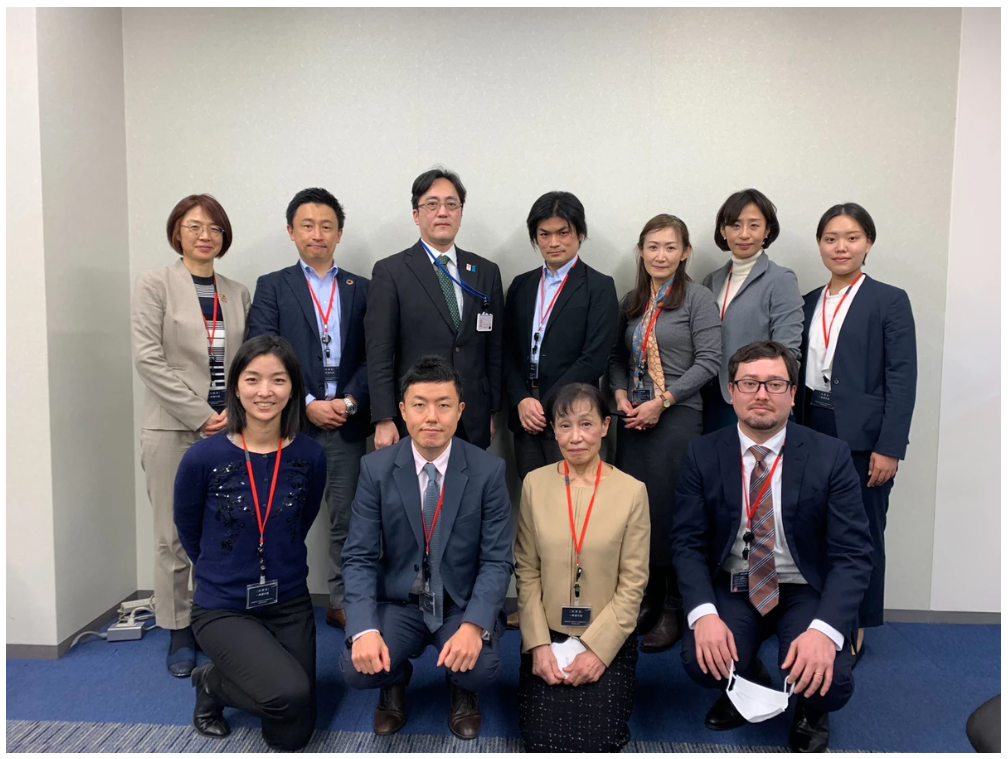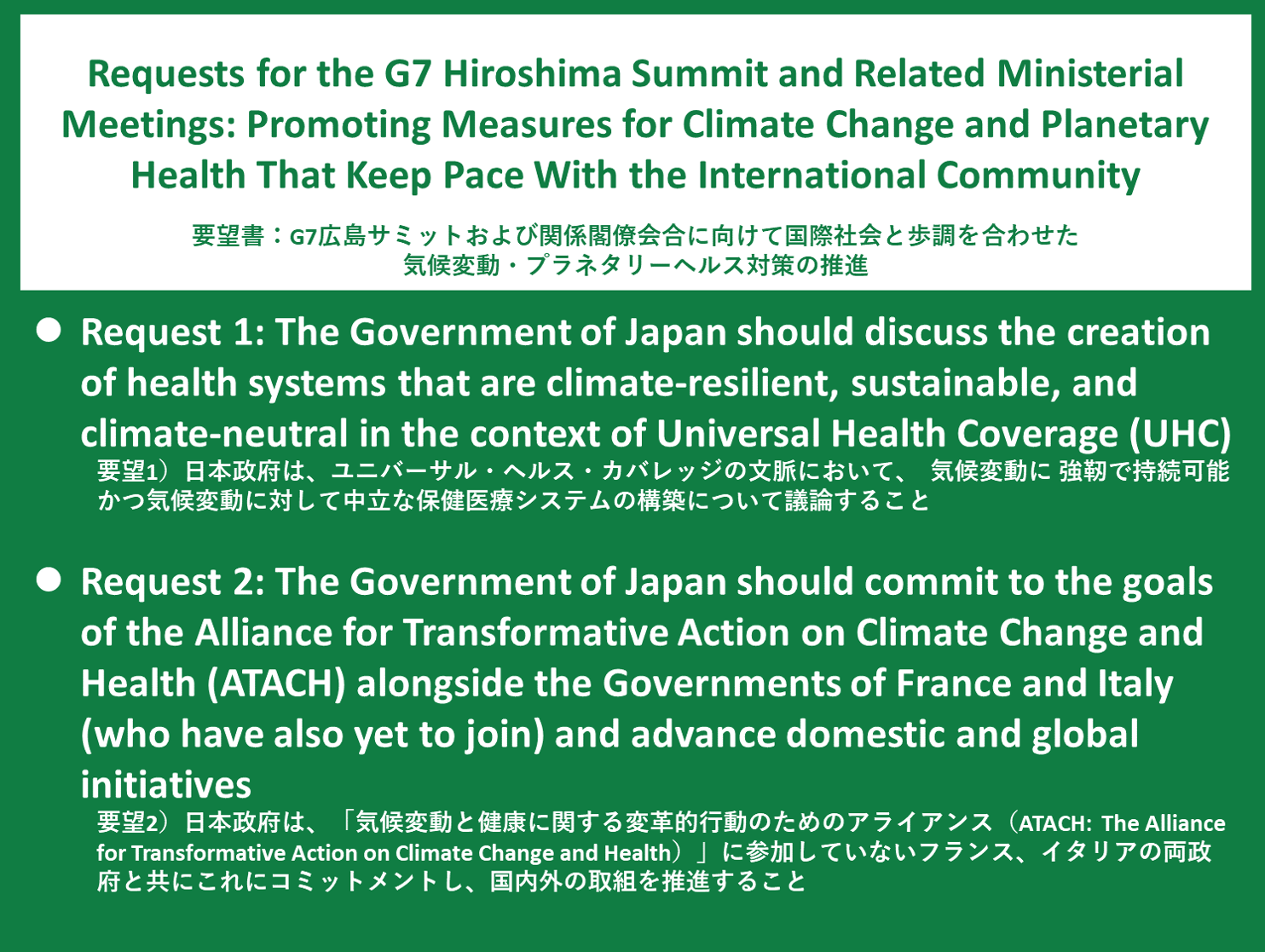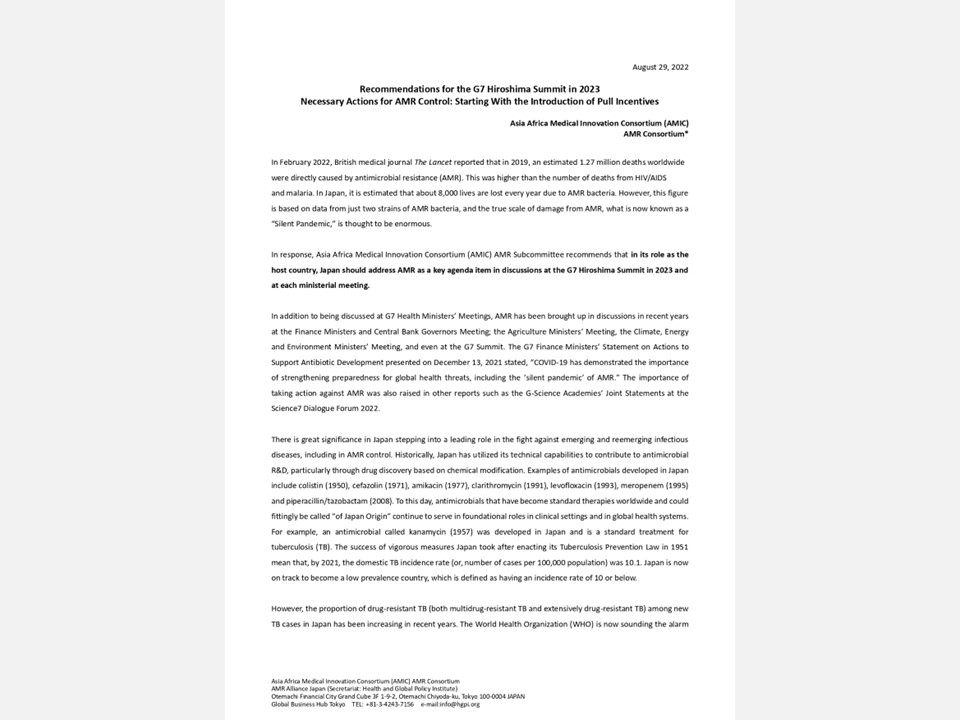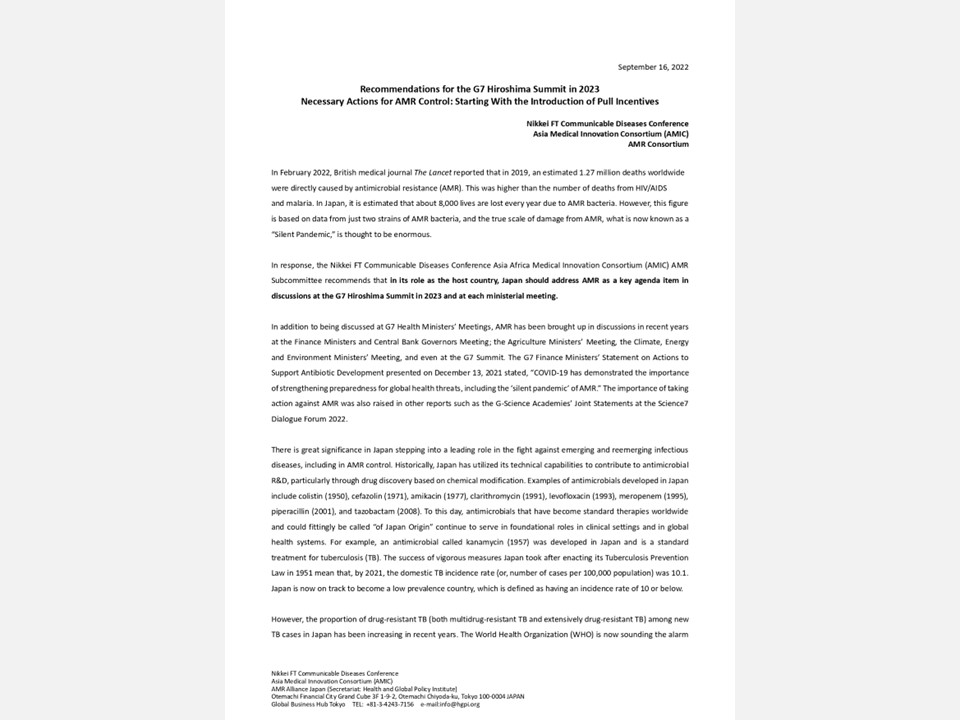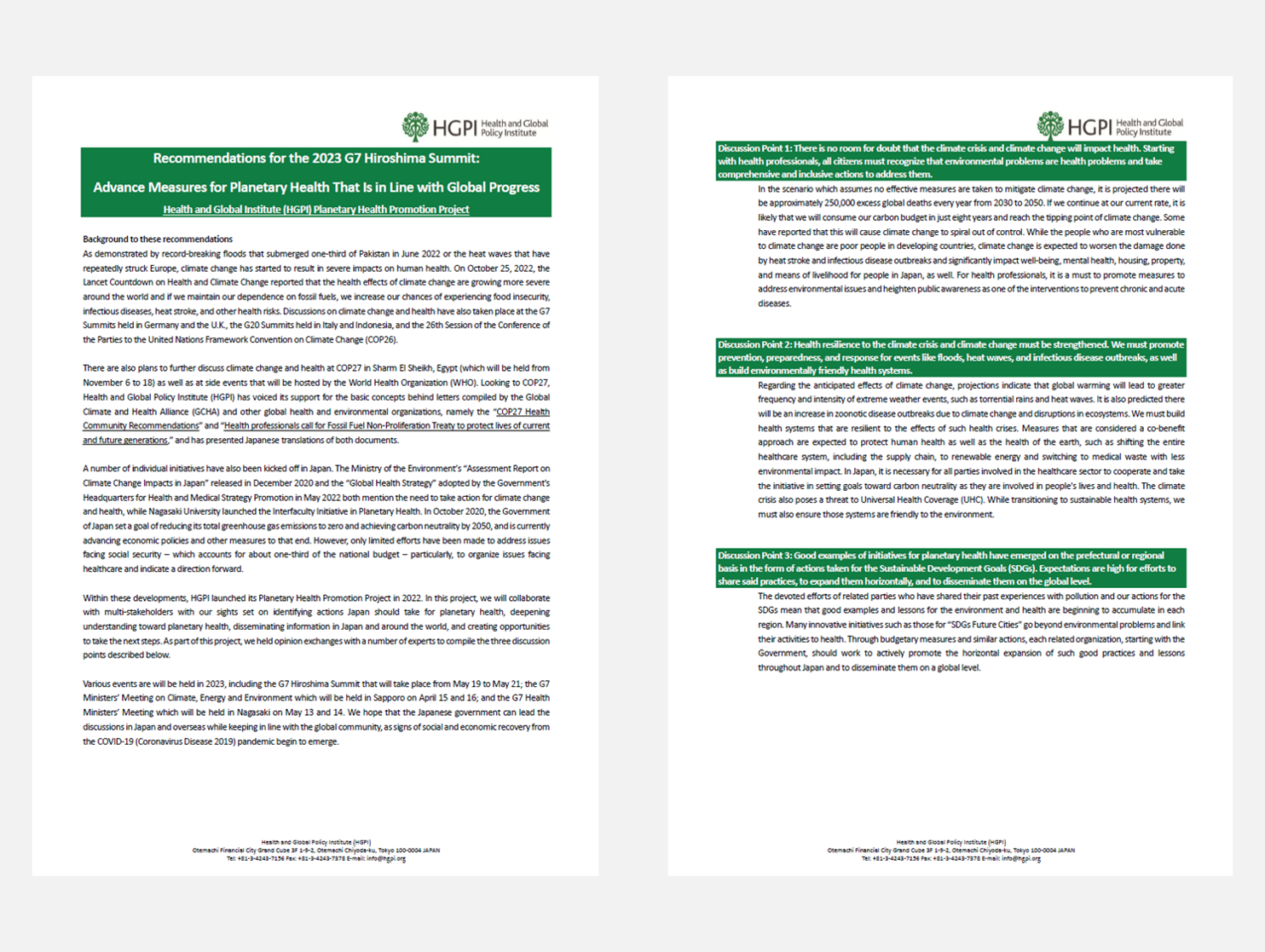[Recommendations] The Political Leadership and International Collaboration Needed to Advance Antimicrobial Resistance (AMR) Countermeasures (December 19, 2022)
date : 1/26/2023
Tags: AMR
![[Recommendations] The Political Leadership and International Collaboration Needed to Advance Antimicrobial Resistance (AMR) Countermeasures (December 19, 2022)](https://hgpi.org/en/wp-content/uploads/sites/2/amr-20221219-top_ENG.png)
Health and Global Policy Institute (HGPI) released recommendations for the G7 Hiroshima Summit entitled, “The Political Leadership and International Collaboration Needed to Advance Antimicrobial Resistance (AMR) Countermeasures.”
[Summary]
Recommendation 1: Continue providing the political leadership needed to combat AMR.
Recommendation 2: Establish opportunities to examine AMR countermeasures at discussions that span multiple fields like the Joint Conference of Foreign Ministers and Health Ministers.
Antimicrobial resistance (AMR) has been continuously recognized as a public health threat of greatest concern both in Japan and abroad, and concentrated efforts from various related parties around the world have resulted in steady progress in measures to combat AMR. In recent years, the G7 has recognized that achieving comprehensive innovation in all areas of prevention, diagnosis, and treatment will be crucial for pandemic prevention, preparedness, and response (PPR).
As we enter the post-COVID-19 era, we must not overlook the role of antimicrobials as global public goods if we wish to continue enjoying peace, stability, and prosperity.
As discussions on international agreements regarding infectious diseases like the International Health Regulation (IHR) and the Pandemic Treaty continue to advance, it will be important to promote AMR countermeasures based on the concept of One Health, in which the health of humans, animals, and the environment are viewed as one. To this end, opportunities for discussions that cut across fields and advocate for that approach should be established at G7 Summits and other high-level meetings. Consideration of financial resource mobilization is also required. As the next G7 President in 2023, it will be crucial for Japan to fulfill its commitments to the international community based on the fact that infectious disease control cannot be fully implemented by countries acting alone and that each country’s interests are adjacent to those of the entire world.
For further details, please see the end of the PDF.
Recommendations for the G7 Hiroshima Summit
The Political Leadership and International Collaboration
Needed to Advance Antimicrobial Resistance (AMR) Countermeasures
Background
Antimicrobial resistance (AMR) has been continuously recognized as a public health threat of greatest concern both in Japan and abroad and concentrated efforts from various related parties around the world have resulted in steady progress in measures to combat AMR. In recent years, the G7 has recognized that achieving comprehensive innovation in all areas of diagnosis, treatment, and prevention will be crucial for pandemic prevention, preparedness, and response (PPR). That perspective is in line with that of the G7 Ise-Shima Summit held in 2016 (the last time Japan served as G7 President) as well as those of Japan’s Basic Policies for Economic and Fiscal Management and Reform every year since 2016. Aiming to utilize this momentum, Health and Global Policy Institute (HGPI) presents the following recommendations on promoting more comprehensive and effective measures for AMR control in preparation for the upcoming G7 Hiroshima Summit in 2023. HGPI has already generated various recommendations on AMR control, including those that focus on the utilization of pull incentives. To view our recommendations regarding this issue, please visit our website.
Recommendation 1: Continue providing the political leadership needed to combat AMR.
Every year since the 2016 G7 summit, the importance of taking action to combat AMR has been mentioned in statements from the Health Ministers’ Meetings; the Finance Ministers and Central Bank Governors Meetings; the Agriculture Ministers’ Meetings; the Climate, Energy and Environment Ministers’ Meetings; and even at Leaders’ Summits. In February 2022, British medical journal The Lancet reported that in 2019, an estimated 1.27 million deaths worldwide were directly caused by AMR. This was higher than the number of deaths from HIV/AIDS and malaria. The annual number of global deaths due to AMR infections is projected to increase to about 10 million people by 2050, mostly in Asia and Africa. AMR is also a growing problem for the three major infectious diseases (HIV/AIDS, tuberculosis, and malaria). If appropriate measures to combat AMR had been in place among G7 members in 2019, a total of 500,000 lives may have been saved. G7 members should stand at the forefront of the international community and continue providing political leadership to advance AMR countermeasures.
Recommendation 2: Establish opportunities to examine AMR countermeasures at discussions that span multiple fields like the Joint Conference of Foreign Ministers and Health Ministers.
Beyond the G7 members, the international community has come to recognize the need to address emerging and reemerging infectious diseases including efforts to combat AMR. The Sustainable Development Goals (SDGs), which were adopted in 2015 at the United Nations Sustainable Development Summit (UN Summit), provide a representative example of such efforts. SDG Target 3.3 reads, “End the epidemics of AIDS, tuberculosis, malaria and neglected tropical diseases and combat hepatitis, water-borne diseases and other communicable diseases by 2030.” The SDGs have also adopted “Percentage of bloodstream infections due to selected antimicrobial-resistant organisms” as an indicator. In Japan, AMR was discussed as an independent item during the 2022 revision of the “Global Health Strategy,” which emphasized the need for AMR countermeasures. International society has come together to meet the SDGs by 2030 and AMR countermeasures must be positioned as a global priority topic alongside climate change and similar issues that require international collaboration and a One Health approach. Joint conferences such as those with Foreign Ministers and Health Ministers or Health Ministers and Finance Ministers should be held and AMR measures should be discussed.
The international collaboration needed for AMR control and its significanceAs we enter the post-COVID-19 era, we must not overlook the role of antimicrobials as global public goods if we wish to continue enjoying peace, stability, and prosperity. For example, Ukraine is currently faced with the issue of AMR in the form of an epidemic of multi-drug resistant tuberculosis (MDR-TB). As discussions on international agreements regarding infectious diseases like the International Health Regulation (IHR) and the Pandemic Treaty continue to advance, it will be important to promote AMR countermeasures based on the concept of One Health, in which the health of humans, animals, and the environment are viewed as one. To this end, opportunities for discussions that cut across fields and advocate for that approach should be established at G7 Summits and other high-level meetings. As the next G7 President in 2023, it will be crucial for Japan to fulfill its commitments to the international community based on the fact that infectious disease control cannot be fully implemented by countries acting alone and that each country’s interests are adjacent to those of the entire world.
Top Research & Recommendations Posts
- [Policy Recommendations] The Path to a Sustainable Healthcare System: Three Key Objectives for Public Deliberation (January 22, 2026)
- [Research Report] The 2025 Public Opinion Survey on Healthcare in Japan (March 17, 2025)
- [Research Report] Perceptions, Knowledge, Actions and Perspectives of Healthcare Organizations in Japan in Relation to Climate Change and Health: A Cross-Sectional Study (November 13, 2025)
- [Policy Recommendations] Reshaping Japan’s Immunization Policy for Life Course Coverage and Vaccine Equity: Challenges and Prospects for an Era of Prevention and Health Promotion (April 25, 2025)
- [Research Report] The 2023 Public Opinion Survey on Satisfaction in Healthcare in Japan and Healthcare Applications of Generative AI (January 11, 2024)
- [Research Report] AMR Policy Update #4: Cancer Care and AMR (Part 1)
- [Public Comment Submission] “Assessment Report on Climate Change Impacts in Japan (Draft Overview)” (December 24, 2025)
- [Policy Recommendations] Developing a National Health and Climate Strategy for Japan (June 26, 2024)
- [Research Report] The Public Opinion Survey on Child-Rearing in Modern Japan (Final Report) (March 4, 2022)
- [Research Report] Survey of Japanese Physicians Regarding Climate Change and Health (December 3, 2023)
Featured Posts
-
2026-01-09
[Registration Open] (Hybrid Format) Dementia Project FY2025 Initiative Concluding Symposium “The Future of Dementia Policy Surrounding Families and Others Who Care for People with Dementia” (March 9, 2026)
![[Registration Open] (Hybrid Format) Dementia Project FY2025 Initiative Concluding Symposium “The Future of Dementia Policy Surrounding Families and Others Who Care for People with Dementia” (March 9, 2026)](https://hgpi.org/en/wp-content/uploads/sites/2/dementia-20260309-top.png)
-
2026-02-05
[Registration Open] (Webinar) The 141st HGPI Seminar “Current Status and Future Prospects of Korea’s Obesity Policy: Voices of People with Lived Experience in Policy Promotion” (March 3, 2026)
![[Registration Open] (Webinar) The 141st HGPI Seminar “Current Status and Future Prospects of Korea’s Obesity Policy: Voices of People with Lived Experience in Policy Promotion” (March 3, 2026)](https://hgpi.org/en/wp-content/uploads/sites/2/hs141-top-1.png)
-
2026-02-06
[Research Report] AMR Policy Update #5: Cancer Care and AMR (Part 2)
![[Research Report] AMR Policy Update #5: Cancer Care and AMR (Part 2)](https://hgpi.org/en/wp-content/uploads/sites/2/HGPI_20260204_AMR-Policy-Update-5.png)




